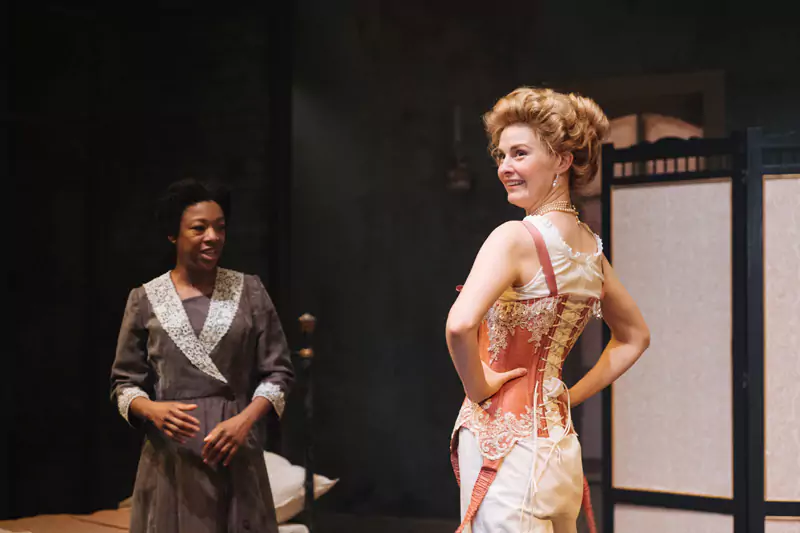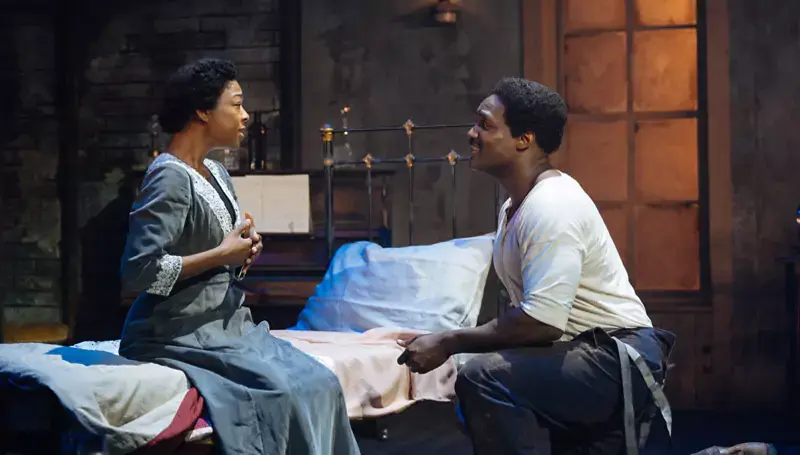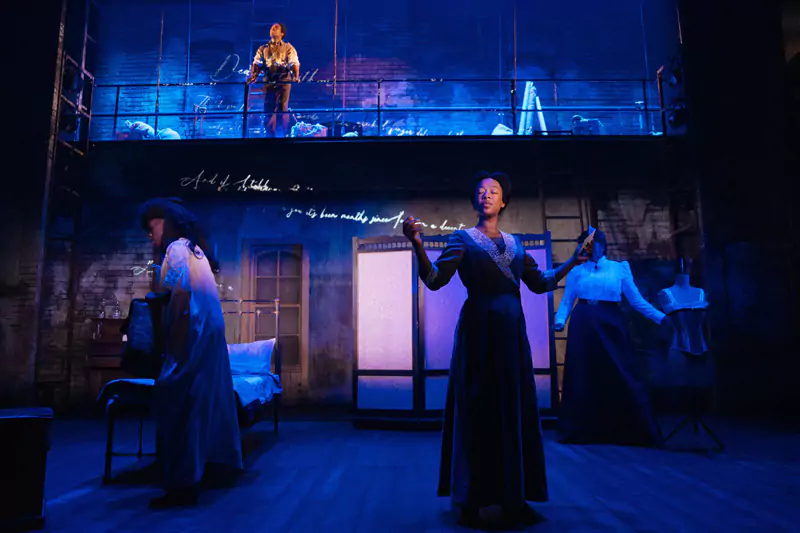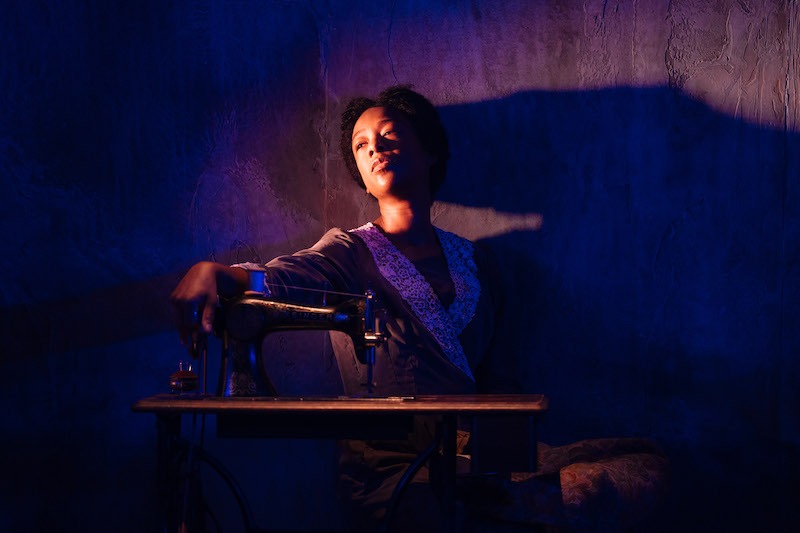Review by Simon Jenner, July 11 2025
“I … sew intimate apparel for ladies, but that ain’t for gentleman’s eyes. Sure I can tell him … about fabric, but that hardly seems a life worthy of words.” So Esther puts down wealthy Mrs Van Buren who can’t speak of what she wants. But in Esther’s world, words and fabric both conceal and reveal. Some men get fabric, some don’t. Some people sew with words, and some can’t. Lynn Nottage’s 2003 masterpiece Intimate Apparel arrives at the Donmar Warehouse directed till August 9th by Lynette Linton.

Samira Wiley and Claudia Jolly. Photo credit: Helen Murray.
This possibly is, as some say, the theatrical event of the year. Certainly the Donmar are on a winning streak with American Theatre and particularly with Nottage: whom they’ve served three times recently. Her superb Sweat appeared 2018-19, and remarkable Clyde’s at the end of 2023. When you look back at Donmar seasons they stand out even there.
All three depict work environments. This unlike those two successors is historical, set in 1905’s New York, based speculatively on a great-grandmother Nottage never knew. Talented sewer Esther (Samira Wiley) lives with seven other women in a boarding house presided over by kindly but protective Mrs Dickson (Nicola Hughes, adamantine no-nonsense, but who can melt and never admit it). Legendary amongst those who know, including clothiers and private clients, Esther saves over years.
Wiley’s glowing performance is at once sharp yet projects Esther’s consciousness. A woman whose unknowing balances with gradual awakening. Wiley often never rises above quiet speech. Yet she holds the stage with riveting authority in a performance terraced with nuance and quiet registers of what happens to Esther. There’s hope, tempered by a steeliness Wiley conveys so absolutely she seems as inured as Esther.
Already 35, unmarried and having only once kissed a man, Esther still harbours romance, but doesn’t dwell on it. Strangely though, she’s been receiving letters she can’t read, from one George (Kadiff Kirwan) who’s eloquence itself. He’s writing from the Panama Canal he’s working on; and speaks from the gantry above.
Intrigued, even enthralled, Esther has Mrs Van Buren (Claudia Jolly) read them for her. A delicate flirtation results as Van Buren, flattered and somehow ensnared, writes eloquently back too. Though Esther’s deception is innocent, she can’t know the motives of those around her.

Samira Wiley and Kadif Kirwan. Photo credit: Helen Murray.
Esther can’t even quite trust herself. Nor can clothier Mr Marks (Alex Waldmann) who so admires her. Yet his religion means he can’t even touch Esther. Waldmann often vaults to Circle-level to retrieve a bolt of cloth or silk to spread before Wiley. Esther and Marks grow a tacit intimacy through shared love of craft and material. It’s through fabric’s proxy though: achingly separated by a shiver of silk. Can Mr Marks or Esther trust themselves? Waldmann mix of warmth and flinching back, yet darting instinct, like Wiley’s Esther, stitches and unstitches what they might acknowledge.
Esther can trust talented local singer/piano player Mayme (a vibrant and sparkling Faith Omole) who still can’t fathom why Esther won’t judge her for serving men’s desires just to eat. It’s part of Nottage’s skill that Esther’s revealed not only as a moral agent, but one who quietly rejects the cant passing as morality that life might have oppressed her with.
A clever plot-twist allows Mayme not to realise something as Esther unites with George. When handsome George appears Kirwan switches register from the eloquent letter-writer, radiant with what he sees of his fellow builders on the Panama Canal, and their misfortunes. George is affable, certainly handsome, but there’s something wrong. Kirwan peels back a subtly different man: at best more bewildered in his dreams. Like Mayme his natural joy is turned in on itself in a subtle calibration of racist culture. Frustrated and lonely Mrs Van Buren too is concealing something she can no longer keep to herself. Jolly morphs from confiding to near desperate. Yet nothing’s overstated. There’s no obvious apparent-liberal-but-white narrative.
Nottage suggests the set be spare allowing fluidity: a given in the Donmar’s space. So Alex Berry’s set is even more ingenious. There’s props indeed including a Singer sewing-machine, cloths stowed high up near the Circle; vanity units, and bed. Items often swirl in front of Gino Ricardo Green’s remarkable video design of tenements and slowly-apparating writing that invades not just back-wall but the floor. On George’s Act One balcony a Panama radiance seems like promise. It’s suffused and lit by Jao Morjaria with XANA’s infiltrating music, filtered in George Dennis’s discreet sound.
The second act unravels in a masterly fashion. Everything built up, like a corset, is unloosed. What we thought we knew we don’t. What Esther didn’t know she not only discovers, she too has to decide on how, or if, to convey it. And to whom. As she comes full circle, Esther knows more than anyone, and thanks Mrs Dickson, in a last line, for something as delicate as lace. Outstanding.
Wigs, hair and make-up designer, Cynthia De LaRosa; movement and intimacy, Shelley Maxwell; casting, Lotte Hines CDG and Anna Cooper CDG; voice and dialect coach, Hazel Holder; photography, Helen Murray.



